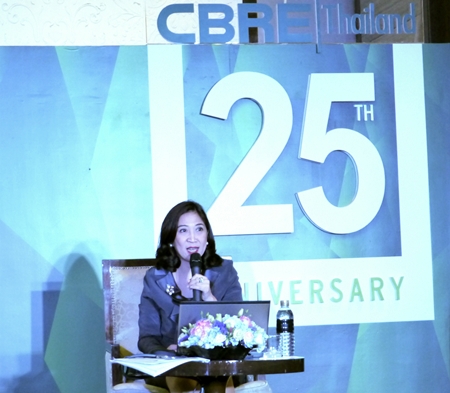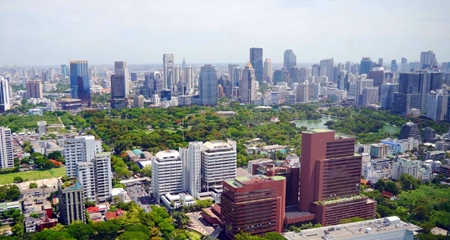Property management and consultancy firm CBRE recently marked its 25th anniversary of doing business in the kingdom by pausing to reflect on the changes in the Thai property market and outlined some predictions for the future.
Bangkok Residential Market:
Central Business District: The Bangkok condominium market has grown significantly from having less than 10,000 condominium units in 1988 to over 350,000 units today. With continuous supply coming on to the market, the condominium market will become even more complicated and competitive, says CBRE. The downtown CBD market offers a wide range of units with higher prices per square meter compared to the midtown market which is almost exclusively made up of one-bedroom units.
 CBRE Thailand Managing Director, Aliwassa Pathnadabutr, talks during a press conference marking the company’s 25 years of business in Thailand.
CBRE Thailand Managing Director, Aliwassa Pathnadabutr, talks during a press conference marking the company’s 25 years of business in Thailand.
Within the prime downtown locations such as areas surrounding Lumpini Park including Rajdamri, Ploenchit, Wireless Road and Langsuan and major main roads in Sukhumvit, there will be fewer new freehold projects as there is limited freehold land available. The high land price above THB 1.5 million per sq.wah which is set to continue to rise further will also affect the feasibility of condominium projects.
In secondary locations within the CBD and sub-sois, developers need to be more cautious in terms of new launching new projects as higher land prices and construction costs will drive up prices over the market affordability.
The prime downtown areas have drawn continued interest from foreign buyers, particularly Asian buyers from Hong Kong/China, Singapore, Taiwan and Japan. They consider Bangkok both attractive and affordable for second residences. CBRE say they expect the downtown market to be a healthy, low volume and high value market with the clearance of built unsold inventory and a limited number of new launches.
Market prices have dramatically shifted over the past two decades from THB 35,000 per sq.m. at Somkid Gardens, one of Bangkok’s first condominium developments, to prices in excess of THB 250,000 per sq.m. today. Whilst each price barrier at THB 100,000, THB 200,000 and THB 300,000 per sq.m. seemed impossible to achieve at the time, these barriers have all been broken. In the next decade, prices will continue to rise on the back of limited freehold supply and increased affluent buyers’ demand for prime CBD locations.
 Bangkok downtown area.
Bangkok downtown area.
The Sukhumvit area has shown the highest price appreciation in recent years and no one would have predicted prices of THB 200,000 per sq.m. 18 months ago, says CBRE. With continued redevelopment, the sky train and new major retail and office developments, Sukhuvmit is becoming the prime location, all be it at a discount to Central Lumpini prices.
Midtown: The midtown market has the biggest challenge in terms of supply volume and distortions in the percentage of one-bedroom and studio properties, yet it remains the only purchase opportunity closest to the CBD for young middle-level executives and white collar employees. Developers in this segment should be cautious about the potential for saturated demand in certain locations, particularly for first-time developers. The report says there is an imbalance in the midtown market that will need to be corrected.
CBRE believes that the Bangkok condominium market is set to grow further and will encroach on the suburbs. The midtown market will face a situation where a small condominium unit with proximity to a mass transit station will be more expensive than a townhouse in the same general area and growing competition for midtown and emerging suburban locations with lower prices. This conflict will be resolved with sizing and market pricing and will require in-depth market study to ensure feasibility. At present, the midtown market is not a market for short-term speculators as the re-sale market will be less liquid.
Office Market
With over 8 million sq.m. of office accommodation in Bangkok today, compared to less than 1 million sq.m. 25 years ago, the office stock in Bangkok is significant and 25% more than that of Singapore. The quality of standards of the best buildings are now also on par with the world’s leading cities, where new buildings are designed around the tenant’s needs to offer features such as flexible floor plates and high-speed zoned lifts. The growing eco-trend is also reflected in the increasing number of LEED certified buildings with energy saving features.
The office market is moving into a period of robust health, and for the first time in 20 years, the market is becoming a landlord’s market and the first time in 5 years where take-up has exceeded 100,000 sq.m. per annum, with further growth expected. At present, the market record rent is THB 980 per sq.m. per month at Park Ventures on Wireless Road, the highest level of rent achieved in the past 25 years, even higher than the previous peak in 1992-1993 at THB 820 per sq.m. per month at Diethelm Towers, Wireless Road.
Office rents in Thai Baht terms will continue to appreciate, but still offer extremely good value regionally. In many respects, says CBRE, Bangkok is a natural regional base, particularly with the opening up of Myanmar. If a regional office package incorporating work permits and visas, the transfer of technology and tax benefits was improved by the government to attract companies such as in Hong Kong and Singapore, the service sector could grow significantly. Bangkok can offer regional companies a base for their operators at a third of the cost of Singapore.
The footprint of the Bangkok office market is also evolving. It is no longer just one CBD market, but a number of viable Secondary Business Districts (SBDs) have emerged. For example, with the extension of mass transit connections and retail in the north of Bangkok, the Ratchada area is becoming the predominant choice for office locations compared to Vibhavadee, which was once a popular area in the past before the mass transit system was completed.
Land & Investment
Bangkok has lagged behind Hong Kong and Singapore in terms of transactions of high quality tenanted, income generating investment property such as offices, retail centres and hotels, with only one to two transactions complete per year. With the advent of REITs, property funds and a higher profile of the Bangkok market within the region, CBRE predicts this will change. As an example, the company recently completed the transaction of Liberty Square, a 40,000 sq.m 23-storey office building adjacent to Silom BTS earlier this year.
However, with the office market on its’ rising cycle, most landlords of Grade-A offices will hold on to their properties to capitalise on the high returns. Buying opportunities may exist for older properties in a good location, but will require renovation or refurbishment to enhance long-term appreciation.
Competition for key land sites will always be fierce as evidenced by the tender of Crown Property Bureau’s Suan Lum site. Within the land map of Bangkok’s prime locations, there are clearly extremely valuable sites with huge development potentials such as Makkasan and sites owned by government organisations such as the state railway land and the port and tobacco monopoly, which are mostly available on leasehold.
The current Thai law permits a maximum registered lease term of 30 years. In CBRE’s view, in the modern property economy, 30-year leaseholds will become increasing unviable as it would not be financially feasible for quality large scale investments. The government and developers would benefit from the extension of the 30-year lease to a maximum of 99 years. The market would be healthier and perform better for both freeholders and leaseholders and would encourage large-scale income producing projects and transactions.
A longer lease period would offer the ability for investors to purchase long-term interests and allow for at least one redevelopment cycle, following the patterns adopted in other markets such as Europe. The extension of the leasehold term would also simplify the 30+30+30 leasehold tenure and be of significant benefit to the residential sector.
Challenges & Opportunities
CBRE says a challenge the property market must tackle is professional property management. All too often, high quality developments fail to appreciate on completion and deteriorate rapidly due to the lack of expertise and insufficient budgets to maintain their values over the long-term. Without good property management, properties which should become an appreciating asset can become a depreciating consumer durable which is illiquid.
Co-owners must realise the necessity of raising CAM fees in cases where the budget is insufficient to manage and maintain a property effectively to a high standard. It is vital to the property market to ensure long-term appreciation where quality is sustained. For example, selected quality buildings in Bangkok age significantly within less than 10 years, whereas 100 year old properties in Manhattan and London continue to appreciate and remain prime investments.
Another challenging area says CBRE is property taxation. The tax system is complex and does not support constructive growth in the market, both in its approach on tax on rental revenue and upon property disposal. The current taxation system neither benefits the investors nor the government. In many circumstances investors are double taxed with the property tax on rental income and personal income tax.
Amongst the challenges, the market also offers plenty of opportunities for the years to come. With the integration of the ASEAN economies through AEC, Thailand appears to be one of the most highlighted markets. Given its’ strategic location as a regional hub and proximity to borders of emerging economies such as Myanmar and Laos, its property market stands to benefit in various sectors from offices , serviced apartments and residential leasing to hotels.
The opening of Myanmar has been particularly highlighted, where Thailand is expected to be the principal beneficiary. At present, there is an extreme shortage of serviced apartments, hotels and office space in Myanmar. However, there is no clear market understanding by foreign developers, nor land laws at present. There is significant potential for property development and investment in the Myanmar market; however, there are huge risks. The risks equal the rewards and CBRE Thailand is advising a number of international parties for projects in these areas.
The CBRE report concludes by predicting that the market will always present challenges and opportunities. The key to succeeding in any market condition is the ability to adapt to the changing trends. CBRE says Thailand needs to embrace the changes required to develop the market into a truly global property market which attracts large-scale developers and investors, and no longer remain inwardly focused.
For more information, visit the CBRE website at www.cbre.co.th.




